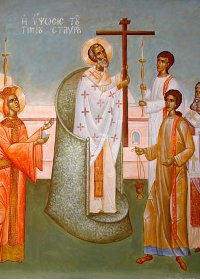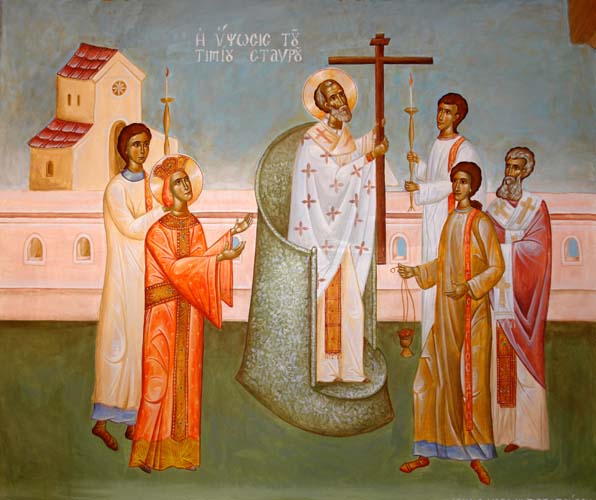Today, beloved brothers and sisters, we mark a great feast, a great celebration: it is the Exaltation of the Precious Cross. This feast carries us off to Golgotha on the day that the Son of Man and the Son of the Virgin was crucified. Today we will speak of the Cross, then. But who is able to sing the praises of the Lord’s Cross as is meet? We, who are but worms, let us dare to sputter out a few words.
The Cross is the flag of Christendom, it is an invincible weapon, it is, “…the beauty of the Church,” it is the ethereal pulpit from which the greatest of words were heard. The Cross is the daystar, it is Noah’s ark, it is the rainbow, it is the sun which shines upon and warms the world. “Help us, O Cross of Christ!”
Much to the chagrin of the demons and the powers of darkness, the Cross has preformed, performs, and will perform miracles; miracles not only in the New Testament era, but even in the days of the Old Testament. The history of the Cross is divided into three periods: before the Crucifixion, the time of the Crucifixion itself, and after the Crucifixion – this is when the great miracle occurred.
When Christ was crucified at Golgotha amongst thieves the earth shook, the tombs opened and the dead were resurrected, the Sun was darkened from the sixth unto the ninth hour, and the curtain of the Temple of Solomon was torn in two. These are all small things. The great miracle is that at that precise hour the devil was defeated, for the blood of Christ became another Jordan in which every sinner is washed clean. Just a drop of the God-Man’s blood washes away the sins of the world: “…with his stripes we are healed,” Isaiah tells us, and, “…the blood of Jesus Christ his Son cleanseth us from all sin,” according to John. This is the great miracle.
The enemies of the Cross – how can we not to say this? – are those who blaspheme, those who open their filthy mouths and blaspheme the precious Cross. In Greece, where the Cross is our national symbol, there ought not to be even a single person who utters blasphemies.
But we too are enemies of the Cross, my beloved brothers and sisters. How can this be? It might be that we venerate the Cross; that we weep in front of it; that we fast on account of it today. Our works, however, are unworthy of the Cross. What does the Cross mean? Take some chalk and write this on the blackboard. The Cross is truth, justice, humility, forgiveness, respecting the other: it is whatever is beautiful and exalted. Above all the Cross is sacrifice and love; love even for enemies. We have been taught to, “…love one another,” and to, “…love [our] enemies.” We have these virtues? Then let us venerate the Cross. We don’t have them? Then we too are enemies of the Cross – not directly, but indirectly.
The Cross ought to be everywhere, then: in churches, in our homes, in schools, in the marketplace, in courthouses, on military bases, in prisons, on the chests of our children and young people. The Cross in the morning when we wake up; the Cross when we eat; the Cross in the evening – even in the middle of the night! “I fall down and make my cross, and an angel is at my side,” our unlettered ancestors used to say. The Cross ought to be everywhere. Above all, however, the Cross ought to be in our hearts. And when the end of our life comes (which is like a small version of the end of the world) and like the thief we say, “Lord, remember me when thou comest into thy kingdom,” then on our grave a wooden cross will stand declaring that we are true children of he who was crucified. O ye Christians praise the Lord and supremely exalt him unto the ages!
Metropolitan Augoustinos (Kantiotes) of Florina


